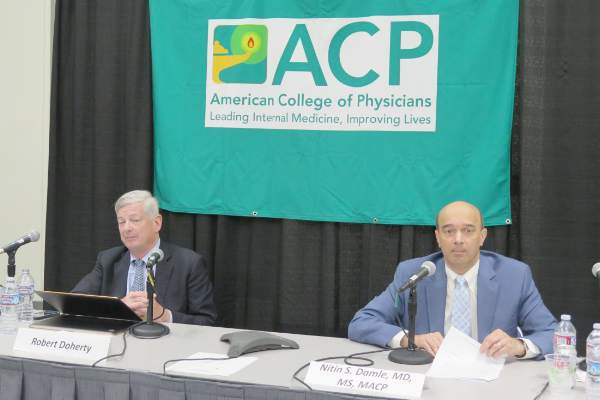AT ACP INTERNAL MEDICINE
SAN DIEGO – The decision by House Republicans to withdraw the American Health Care Act on March 24, 2017 was a victory for the health care of all Americans, especially older, sicker, and poorer patients, according to Nitin S. Damle, MD.
“It was a terrible bill,” Dr. Damle, president of the American College of Physicians, said during a press briefing at the annual meeting of the ACP. “Fortunately it will not become law at this point, but the story doesn’t really end here. The Trump Administration needs to decide whether it’s going to help faithfully implement the Affordable Care Act or sabotage it, either by action or inaction. It’s also important that we turn the page and begin the hard work of engaging with the administration and Congress on a bipartisan agenda to improve American health care.”
According to the Congressional Budget Office (CBO), had the AHCA become law the number of uninsured would have skyrocketed to 24 million, and 14 million would have been uncovered as of 2018. Dr. Damle, who practices in Wakefield, R.I., said that without health insurance, people are less likely to have access to a physician, less likely to get cancer screening, less likely to get vaccinated, less likely to keep up with their medications, and more likely to receive care in an expensive setting like the emergency room. “They’re also more likely to wait to be treated until their disease has reached a more advanced stage and is less treatable – very serious consequences,” he said.
The ACHA would have eliminated the federal requirement that insurers cover 10 categories of essential benefits including emergency care, maternity services, and hospitalization, leaving it to states to decide. It also eliminated the requirement that Medicaid cover the same essential benefits. According to Dr. Damle, the AHCA’s age-based tax credits “were too low and the deductibles were going to be too high for older people and poorer patients, because insurers would have been allowed to charge older patients up to five times more than younger patients for their coverage.” For example, the CBO found that under the bill a 64-year-old male who makes $26,500 a year would have to pay $14,600 out of pocket for insurance in the non-group market, compared to $1,700 under the existing ACA, a 750% increase.
“In my practice, I have many older and sicker patients who would have been left behind had this become law, patients with diseases like congestive heart failure, diabetes, chronic obstructive pulmonary disease from smoking who require frequent and ongoing monitoring of their medications, development of any complications from their disease, and sometimes even need home-based support,” Dr. Damle said.
Robert B. Doherty, senior vice president of governmental affairs and public policy for the ACP, described efforts to roll back the ACA as “unchartered” territory. “I have never in the past seen an administration trying to roll back coverage on millions of people,” he said. “This history of the US has been incremental expansion of coverage since the creation of Medicare and Medicaid in 1965.” He acknowledged certain shortcomings of the ACA, including uneven participation by insurers from state to state, and “deductibles may be too high, and premiums too high for some people. On the other hand, the ACA has achieved an historic reduction in the uninsured rate in the United States. More than 20 million people have gained coverage, and according to the CDC, only 8.2% of Americans are without health insurance, an historic low. It’s still too high, but we’re basically 92% of the way to universal coverage in the U.S.”
Mr. Doherty expressed concern that legislative efforts to roll back the ACA could re-emerge. “The Republicans are still talking about bringing it back,” he said. “You can’t take it for granted because Republicans have been promising repeal and replace [legislation] for seven years now, and I think they want to move forward. I think we have to remain vigilant. We have to put pressure on the [Trump] administration to make sure they faithfully execute the law, which they swore to do when they took office. Then we have to reach out and say there are problems that need to be addressed, bipartisan solutions to stabilize the [health insurance] markets and to address other issues like the crushing administrative burden on physicians. You have to start by accepting that the ACA is the law of the land. We need to build upon it and improve it, not repeal it.”






